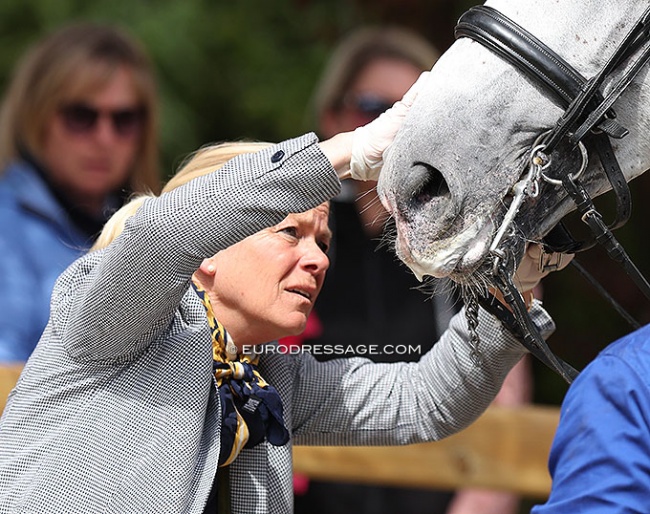
A study group from the French National Assembly has outlined recommendations to help improve equine welfare at the Paris 2024 Olympic and Paralympic Games.
Published last month, the new report proposes 46 recommendations to improve the treatment of animals ranging from feeding them hay several times a day to less whipping in competition and lowered obstacles in modern pentathlon.
"It is essential that this planetary event be an opportunity to raise awareness among the general public and all professionals of equine well-being and it must be nothing other than a source of pleasure for horses, riders and spectators," notes the study group chaired by Loïc Dombreval.
Animal Welfare Priority
The report suggests that the horses need to be accommodated in large and well-ventilated boxes which align with International Equestrian Federation (FEI) regulations.
It also proposes to improve control of excessive tightening of nosebands and curb chains as well as to create a list of authorised bits and prohibit the "belly bands" - a wide band which surrounds the belly of the horse to protect and prevent injury and irritation from spurs, but it also allows the rider to mount the horse if he is injured.
The use of the whip could be reduced to once during the event and twice during the warm-up "under penalty of sanctions", while the use of draw reins/running reins was suggested to be banned.
"These recommendations will probably seem excessive to some professionals and insufficient to some animal rights activists," the report concludes.
Welfare Committee
The establishment of a "welfare committee", made up of independent experts who can supervise the welfare of the horse, was also suggested.
Paris 2024 equestrian events are set to be staged at the Château de Versailles.
46 Recommendations
The Australian website Horses and People did a detailed write-up about the 46 recommendations and for dressage.
The website mentioned that "it is up to the Organizing Committee of the Paris 2024 Olympic Games and it alone, in conjunction with the various organizations interviewed, to decide on the future of these recommendations."
At the 2022 FEI Sports Forum in Lausanne last week, it was mentioned that a proper organizer for the equestrian part of the Games still has not been allocated.
Horses and People translated the 46 recommendations.
Eurodressage selected a few of the recommendations which are the more "interesting" onew:
Concerning tack and artificial aids:
- #7: Improve the controls against the excessive tightening of nosebands and curb chains:
Provide a more calibrated check, preformed randomly during training sessions and systematically when entering or leaving each event, using a 1.5 cm ISES taper gauge placed on the nasal bones (which allow one adult finger to slide between the noseband strap and the hard nasal bone) and apply a penalty in the event of an infringement. - #8: Review the list of tack which, by its creative design or manufacture, can cause harm and discomfort to the horse, and prohibit its use in competition, in particular nosebands that increase the capacity to tighten (crank, lever, grackle, double, etc.) as well as flash nosebands in all disciplines: Create a positive list of authorized nosebands
- #10: Prohibit the use of tandem/combination bits, bits with twisted or double mouthpieces, and all bits that do not align with equine welfare, and create a list of authorized mouthpieces.
- #13: Prohibit the fitting of tendon boots on the hindlegs by extending the FEI rules already in place for young horses, to all horses in all disciplines. Increase control of the tightness of fetlock boots and review their authorization to reduce their use.
- #15: Prohibit the use of the whip more than once per event and more than twice during the warm-up. The use of a whip more than once per event and twice during warm-up will result in a sanction or even disqualification. Video surveillance used as evidence if necessary.
Concerning veterinary care and control
- #21: Conduct longitudinal monitoring of horses in preparation for the Olympic Games and provide for anti-doping samples between 1 month and 15 days before the veterinary visit prior to the events.
- #22: Prohibit all intra-articular injections, whatever the nature of the product injected, 14 days before the official start of the competition and until the end of the event, with no possibility of exceptions on this rule.
- #27: Remove from competition any horses with a medical history that is not compatible with an optimal state of health (e.g. a history of bone, ligament or muscle injury resulting in long periods of inactivity), which is necessary for participation in the Olympic Games. This optimal state of health will have to be verified in advance by the FEI Veterinarians.
- #29: Impose the immediate stopping of a ride at the slightest trace of blood on the horse and eliminate the horse from the rest of the competition.
Concerning dressage
- #31: Enforce the prohibition of intentional or unintentional infliction of unnecessary suffering or discomfort, and of an overly constrained posture or frame. Prohibit flexion of the neck that places the nose line behind the vertical (“hyperflexion”) throughout the Olympic grounds and apply sanctions with immediate effect for all equestrian disciplines.
See the full list of recommendations on Horses and People.
Source © insidethegames.biz - Horses and People
Related Links
On the Ignorance of Noseband Tightness and Vague FEI Noseband Rules
2024 Paris Olympic Format to be Approved at 2021 FEI General Assembly. Teams of Three Retained
Olympic Teams of Three Format and MER, Hot Topics of Discussion at 2021 FEI General Assembly in Antwerp
Noseband Special: Part I: The History of the Noseband
An Investigation into Noseband Tightness Levels on Competition Horses